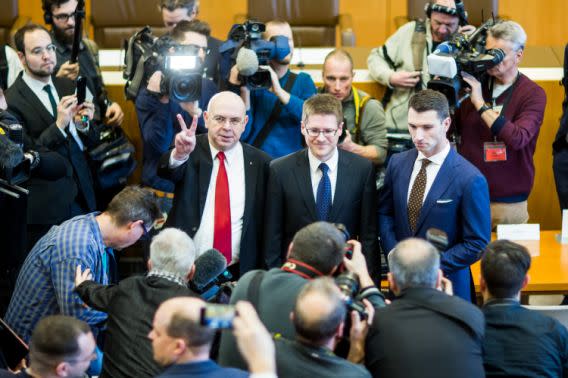German high court rejects ban on neo-Nazi party

After years of debate, the high court of Germany officially rejected on Tuesday a proposal to ban the far-right, neo-Nazi National Democratic Party (NPD).
The Federal Constitutional Court (Bundesverfassungsgerichts — commonly abbreviated as BVerfG) unanimously ruled that the political group, which has been described as anti-Semitic and racist, does not pose an existential threat to Germany’s republic despite violating its constitution.
“The NPD intends to replace the existing constitutional system with an authoritarian national state that adheres to the idea of an ethnically defined ‘people’s community’ (Volksgemeinschaft). Its political concept disrespects human dignity and is incompatible with the principle of democracy,” reads the court’s judgment, which was also released in English. “Furthermore, the NPD acts in a systematic manner and with sufficient intensity towards achieving its aims that are directed against the free democratic basic order.”
However, according to the BVerfG, there is a “lack of specific and weighty indications” that the NPD will be successful in achieving its goals.
Back in 2013, the German Bundesrat, the upper house of parliament, which represents Germany’s 16 federal states, submitted a request to ban the NPD — citing its agenda of anti-Semitism and hypernationalism. This appeal was partly inspired by the shocking discovery of a violent group calling itself the National Socialist Underground in 2011, AFP reported.
According to the high court, the NPD shows clear parallels to National Socialism: Its members celebrate Nazi Party leaders from the 1940s; use vocabulary, literature, music and symbols associated with Nazism; and promote revisionist history that sympathizes with “the mindset of National Socialism.”

It appears “entirely impossible,” BVerfG continued in its judgment, that the NPD would be able to achieve its objectives by parliamentary or extra-parliamentary democratic methods.
There had been another failed attempt to ban the NPD in 2003. The New York Times noted that only two political parties have been banned in Germany since the fall of the Third Reich and the Allied victory in World War II: the Socialist Reich Party of Germany (1952) and the German Communist Party (1956).
The highly anticipated ruling comes at a time of heated debate within Germany over Chancellor Angela Merkel’s controversial decision to welcome more than a million refugees fleeing war and persecution.
In a parallel to Brexit’s surprise victory in the U.K. and Donald Trump’s meteoric ascent in the U.S., conservative factions in Germany have been calling for stronger borders, and resentment toward migrants and refugees has been on the rise.
Right-wing politicians vowing to clamp down on immigration gained power last year amid a spate of terrorist attacks. Another nationalist, Euroskeptic party, Alternative for Germany, has overtaken the NPD among anti-immigrant circles, recently surging to 15 percent in opinion polls, according to the Associated Press.
Read more from Yahoo News:


